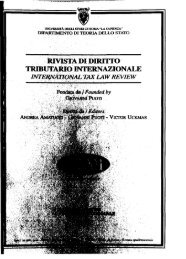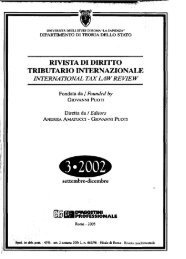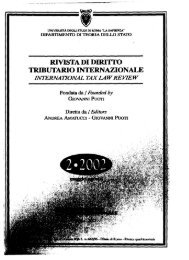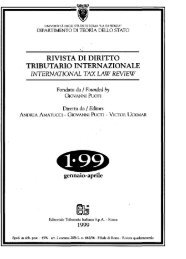RIVISTA DI DIRITTO TRIBUTARIO INTERNAZIONALE - Rdti.it
RIVISTA DI DIRITTO TRIBUTARIO INTERNAZIONALE - Rdti.it
RIVISTA DI DIRITTO TRIBUTARIO INTERNAZIONALE - Rdti.it
You also want an ePaper? Increase the reach of your titles
YUMPU automatically turns print PDFs into web optimized ePapers that Google loves.
Se:.iol1e 1\' - ApPlmti e rassegne<br />
ber States to apply them \dthin their national systems and possibil<strong>it</strong>ies<br />
but controlled by State Aid Guidelines to amid distortion of compet<strong>it</strong>ion<br />
as well as to avoid a subsid:v race intra-Europe and on a global basis. It is<br />
also a clear policy that the guidelines should act as an incentive for Member<br />
States to take support measures rather than as a policing instrument.<br />
A brief analvsis of the kev points and rationale to this policy on State<br />
Aid as expressed by the Commission in the strategy paper and the State<br />
Aid Guidelines themselves givcs clar<strong>it</strong>\' on the principles contained in the<br />
Guidelines. In this summary \I.;e are often verbally quoting the Com mission<br />
to stress the underlying policy.<br />
1. Cellerai<br />
In <strong>it</strong>s Communication "To\vards a new mar<strong>it</strong>ime strategy" of March<br />
1996 and in the introduction to the Commun<strong>it</strong>v Guidelines on State Aid<br />
to mar<strong>it</strong>ime transport published on 5 Iuly 1997 the Commission stressed<br />
the necess<strong>it</strong>y or support measures for EU shipping to remedy the disadvantages<br />
of EU shipping such as:<br />
- Striet manning cond<strong>it</strong>ions to be respected<br />
- Member States fiscal and social arrangements for companies and<br />
their employees making <strong>it</strong> expensive to operate EC registered ships \I.:<strong>it</strong>h I 39<br />
EC seafarers on board<br />
- Few eosts for third country operators entering the open trades.<br />
- Direct compet<strong>it</strong>ion w<strong>it</strong>h these third country operators - benef<strong>it</strong>ing<br />
of more compet<strong>it</strong>ive operational cond<strong>it</strong>ions - in both Intemational and<br />
Commun<strong>it</strong>y trades.<br />
Il was al so stressed that the shipping industry is extremely mobile<br />
and that an onerous regime can easily be avoided through registering vessels<br />
in other countries (giving absolute freedom in manning) and, if necessaI)',<br />
establishing a nominallevel of administration or management outside<br />
the EU (to avoid Member States' fiscal systems). The Commission<br />
also acknowledgcd that, in recent vears, there had been a large supply of<br />
seafarers ava ila bI e from low-wage third countries, giving shipo\\'ner5 a<br />
10\\'-c05t option \vhen selecting crews.<br />
The above cireumstances led to a decrease of the percentage of EU<br />
registered vessels from 32 c iC in 1970 to 14% in 1995. Thc share of the major<br />
open registry countries increased aver the stime period l'rom 19% to<br />
28%. Il is evident that there has al so been a correspondinglv steady decrease<br />
in the number of Eu seafarers aver the same periodo<br />
The Commission also recognised that the flagging out of vessels<br />
is, however, not the end of the problem. Where flag States outside the<br />
EU offer an attracti\'e international services infrastructure, flagging<br />
Rl\'ISTA <strong>DI</strong> <strong>DI</strong>RITIO TRIBCB.RIO L\TERN.\ZIO\"ALE 3i:O(l1






